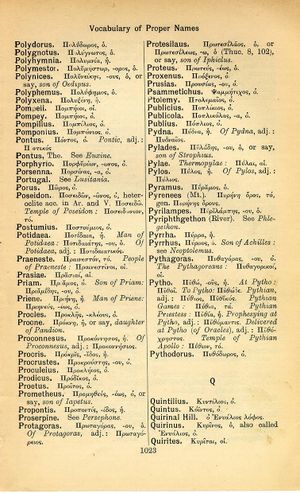Protagoras
αἰὼν παῖς ἐστι παίζων, πεσσεύων∙ παιδός η βασιληίη → time is a child playing draughts; the kingship is a child's | a life-time is a child playing, playing checkers: the kingship belongs to a child | a whole human life-time is nothing but a child playing, playing checkers: the kingship belongs to a child | lifetime is a child at play, moving pieces in a game; kingship belongs to the child
English > Greek (Woodhouse)
Πρωταγόρας, -ου, ὁ.
Of Protagoras, adj.: Πρωταγόρειος.
Latin > English (Lewis & Short)
Prōtăgŏras: ae, m., = Πρωταγόρας,
I a celebrated sophist of Abdera, a disciple of Democritus, and an older contemporary of Socrates; he was banished from Athens on a suspicion of atheism, Cic. N. D. 1, 1, 2; 1, 23, 63; id. Ac. 2, 46, 142; id. Brut. 8, 30; 12, 46; Gell. 5, 3, 1 sqq.—Hence, Prōtăgŏrīon, ĭi, n., = Πρωταγόρειον, a dictum or maxim of Protagoras, Gell. 5, 11, 1.
Latin > French (Gaffiot 2016)
Prōtăgŏrās,¹⁵ æ, m. (Πρωταγόρας), sophiste d’Abdère, chassé par les Athéniens pour son impiété : Cic. Nat. 1, 2 ; Br. 30 || -rīŏn, ĭī, n., une maxime de Protagoras : Gell. 5, 11, 1.
Latin > German (Georges)
Prōtagorās, ae, Akk. am u. ān, Vok. ā, m. (Πρωταγόρας), ein griech. Philosoph aus Abdera, Zeitgenosse des Sokrates, aus Attika verbannt, weil er in den Verdacht des Atheismus kam, Gell. 5, 3, 1 sqq. Cic. de nat. deor. 1, 2. Quint. 3, 1, 10 u. 12; 3, 4, 10: Pr. Abderites, Min. Fel. 8, 3: Pr. sophista, Apul. flor. 18. p. 29, 23 u. 30, 1 Kr. – Dav. Prōtagorīon, īī, n. (Πρωταγόρειον), ein Ausspruch des Protagoras, Gell. 5, 11 in.

